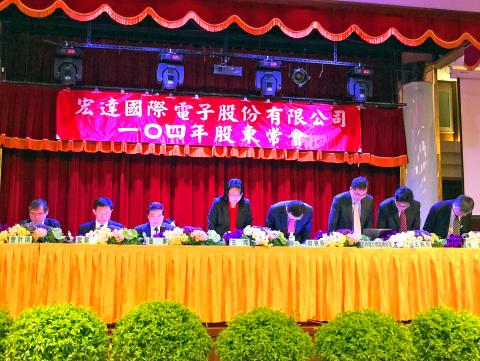HTC chairwoman and chief executive officer Cher Wang (王雪紅) yesterday apologized to shareholders for the company’s disappointing performance over the past few months.
Wang said HTC’s performance was mainly due to its poor operational efficiency and overly conservative marketing strategy amid fierce competition in the global market.
“HTC’s recent performance has let people down,” Wang said at the company’s annual general meeting.

Photo: CNA
Wang’s apology came a day after HTC’s stock price dropped below NT$100 to a 12-year low of NT$98. Shares stood as high as NT$1,300 on April 1, 2011.
This year’s HTC flagship One M9 smartphone, which was launched in April, was criticized for lacking differentiation from its previous model, the One M8. The smartphone also encountered thermal issues causing shipment delays after its sales launch.
In an effort to improve the company’s smartphone segment, HTC’s core business, Wang said the company plans to launch a “hero product” in October, and make significant improvements in innovation and design for the next flagship model next year.
The company is also planning to improve its product mix strategy for smartphones, she added.
Wang said HTC would reduce its production costs by improving production efficiency as well as optimizing its components supply chain, adding that it would also outsource some orders to increase operational flexibility.
Saying that the marketing budgets of Apple Inc and Samsung Electronics Co are 20 times higher than HTC’s, Wang said the firm must improve its marketing strategies.
Chief financial officer Chang Chia-lin (張嘉臨) said that HTC increased research and development investment by 4 percent annually to NT$13 billion (US$419.33 million) last year, while its marketing expenses dropped 19.26 percent to NT$26 billion from a year ago.
HTC does not sell well using conventional marketing strategies, Wang said, adding that it would not renew US actor Robert Downey Jr’s contract after this year, but that it would keep working with the popular Taiwanese rock group Mayday (五月天).
In an attempt to develop new business, HTC would develop virtual reality applications, such as the HTC Vive virtual reality headset that it developed with US-based game developer Valve, Wang said.
Wang said that the HTC Vive, which was unveiled at the annual World Mobile Congress in Barcelona in March, has been well-received by the market and that the company would focus on virtual reality development.
“I am upbeat about HTC’s outlook. We aim to focus on developing the right products,” Wang said.
The company has not announced a launch date for the Vive.
At an investors’ conference in February, Chang said that HTC hopes the non-smartphone segment can contribute at least 10 percent of the firm’s total revenues next year.
HTC’s shares closed up 0.51 percent at NT$98.5 in Taipei trading yesterday, while the TAIEX lost 0.12 percent.

Sweeping policy changes under US Secretary of Health and Human Services Robert F. Kennedy Jr are having a chilling effect on vaccine makers as anti-vaccine rhetoric has turned into concrete changes in inoculation schedules and recommendations, investors and executives said. The administration of US President Donald Trump has in the past year upended vaccine recommendations, with the country last month ending its longstanding guidance that all children receive inoculations against flu, hepatitis A and other diseases. The unprecedented changes have led to diminished vaccine usage, hurt the investment case for some biotechs, and created a drag that would likely dent revenues and

Macronix International Co (旺宏), the world’s biggest NOR flash memory supplier, yesterday said it would spend NT$22 billion (US$699.1 million) on capacity expansion this year to increase its production of mid-to-low-density memory chips as the world’s major memorychip suppliers are phasing out the market. The company said its planned capital expenditures are about 11 times higher than the NT$1.8 billion it spent on new facilities and equipment last year. A majority of this year’s outlay would be allocated to step up capacity of multi-level cell (MLC) NAND flash memory chips, which are used in embedded multimedia cards (eMMC), a managed

CULPRITS: Factors that affected the slip included falling global crude oil prices, wait-and-see consumer attitudes due to US tariffs and a different Lunar New Year holiday schedule Taiwan’s retail sales ended a nine-year growth streak last year, slipping 0.2 percent from a year earlier as uncertainty over US tariff policies affected demand for durable goods, data released on Friday by the Ministry of Economic Affairs showed. Last year’s retail sales totaled NT$4.84 trillion (US$153.27 billion), down about NT$9.5 billion, or 0.2 percent, from 2024. Despite the decline, the figure was still the second-highest annual sales total on record. Ministry statistics department deputy head Chen Yu-fang (陳玉芳) said sales of cars, motorcycles and related products, which accounted for 17.4 percent of total retail rales last year, fell NT$68.1 billion, or

In the wake of strong global demand for AI applications, Taiwan’s export-oriented economy accelerated with the composite index of economic indicators flashing the first “red” light in December for one year, indicating the economy is in booming mode, the National Development Council (NDC) said yesterday. Moreover, the index of leading indicators, which gauges the potential state of the economy over the next six months, also moved higher in December amid growing optimism over the outlook, the NDC said. In December, the index of economic indicators rose one point from a month earlier to 38, at the lower end of the “red” light.